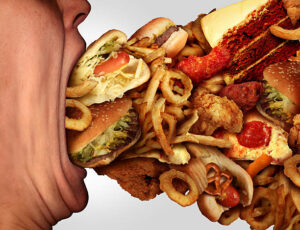Do you often find yourself snacking on unhealthy foods because you’re too busy to eat properly? If so, you’re not alone. A lot of people tend to eat quickly because they don’t have time to sit down and enjoy a meal. Unfortunately, this can lead to weight gain. In this blog post, we will discuss 10 scientific reasons why eating fast causes weight gain. Keep reading to learn more!
10 Scientific Reasons Why Eating Fast Causes Weight Gain
You might be surprised to learn that there are scientific reasons behind why eating fast causes weight gain. Here are the top ten:
Overeating
 Overeating is one of the main reasons why eating fast causes weight gain. When you eat quickly, your brain doesn’t have time to register that you’re full. This is because it takes about 20 minutes for the satiety hormone, leptin, to reach the brain. So, if you eat too fast, you’re likely to overeat before your brain has a chance to tell you to stop. It’s important to eat slowly and savor your food so that you don’t overeat.
Overeating is one of the main reasons why eating fast causes weight gain. When you eat quickly, your brain doesn’t have time to register that you’re full. This is because it takes about 20 minutes for the satiety hormone, leptin, to reach the brain. So, if you eat too fast, you’re likely to overeat before your brain has a chance to tell you to stop. It’s important to eat slowly and savor your food so that you don’t overeat.
Unhealthy food choices
Another scientific reason why eating fast causes weight gain is that it leads to unhealthy food choices. When you’re in a hurry, you’re more likely to grab unhealthy snacks like candy bars or chips. You’re also more likely to eat fast food because it’s quick and easy. Eating unhealthy foods can lead to weight gain and other health problems. It can also make it harder to lose weight in the future. So, it’s important to make healthy food choices when you’re trying to lose weight.
Poor Digestion
Another reason why eating fast causes weight gain is poor digestion. When you eat quickly, you tend to swallow more air. This can lead to bloating, gas, and other digestive problems. Additionally, when you eat quickly, you’re more likely to chew your food less. This can lead to indigestion and other digestive problems. Chewing your food more thoroughly can help improve your digestion and prevent weight gain.
Slower Metabolism
A slower metabolism is another scientific reason why eating fast causes weight gain. When you eat quickly, your body doesn’t have time to burn off all the calories. This can lead to weight gain over time. Additionally, when you eat quickly, your blood sugar levels can spike. This can lead to insulin resistance, which is a major cause of obesity. So, it’s important to eat slowly and give your body time to burn off the calories.
Increased Appetite
Another scientific reason why eating fast causes weight gain is that it can increase your appetite. When you eat quickly, your body releases a hormone called ghrelin. Ghrelin is known as the “hunger hormone” because it increases appetite. When ghrelin levels are high, you’re more likely to feel hungry and eat more food. So, if you’re trying to lose weight, it’s important to eat slowly and avoid overeating.
More Fat Storage
Another scientific reason why eating fast causes weight gain is that it leads to more fat storage. The reason for this is that when you eat quickly, your body releases a hormone called insulin. Insulin helps to store fat in the body. When insulin levels are high, you’re more likely to store fat, especially in the abdominal area. You need insulin to live, but you don’t want too much of it. So, make sure to eat slowly so that your body has time to process the food and regulate insulin levels.
Less Nutrient Absorption
Less nutrient absorption is another scientific reason why eating fast causes weight gain. When you eat quickly, your body doesn’t have time to absorb all the nutrients from the food. This can lead to nutrient deficiencies and weight gain. Some of the nutrients that are not absorbed well when you eat quickly include vitamins, minerals, and antioxidants. So, it’s important to eat slowly and give your body time to absorb all the nutrients from the food.
Increased Stress Levels
 Stress levels can also increase when you eat fast, which can lead to weight gain. When you’re stressed, your body releases the hormone cortisol. Cortisol is known as the “stress hormone” because it increases appetite and can lead to weight gain. When cortisol levels are high, you’re more likely to crave unhealthy foods and eat more. You should keep a check on your stress levels and try to eat slowly when you’re feeling stressed.
Stress levels can also increase when you eat fast, which can lead to weight gain. When you’re stressed, your body releases the hormone cortisol. Cortisol is known as the “stress hormone” because it increases appetite and can lead to weight gain. When cortisol levels are high, you’re more likely to crave unhealthy foods and eat more. You should keep a check on your stress levels and try to eat slowly when you’re feeling stressed.
Hormonal Imbalance
A hormonal imbalance is another scientific reason why eating fast causes weight gain. There are many hormones involved in appetite and weight regulation. When you eat quickly, it can disrupt the balance of these hormones and lead to weight gain. One of the hormones that are affected by eating fast is ghrelin. Another hormone that is affected by eating fast is leptin. Leptin is a hormone that helps to regulate appetite and metabolism. These are just a few of the hormones that can be affected by eating fast.
Lower satisfaction
Eating fast can also lower your satisfaction with food. When you eat quickly, you’re less likely to savor the taste and smell of the food. This can lead to overeating because you’re not getting the full experience of the meal. Additionally, when you eat quickly, you’re more likely to gulp down air. This can cause bloating and indigestion. Try to eat slowly and savor the flavor of your food to avoid overeating. You can also try to chew your food more slowly as this can help to improve satisfaction. A lack of satisfaction with food might be one of the reasons why some people eat fast.
So, there you have it. These are ten scientific reasons why eating fast causes weight gain. If you’re trying to lose weight, it’s important to eat slowly and give your body time to digest the food properly. Additionally, try to avoid overeating and stress
How To Overcome?
 If you’re someone who often eats quickly, there are ways to overcome these reasons. Here are a few tips:
If you’re someone who often eats quickly, there are ways to overcome these reasons. Here are a few tips:
- Make time for meals: Meals are important and you should make time for them. Sit down and enjoy your meal without rushing. Take your time to chew and savor the flavor of your food. At least 30 minutes is ideal, but if you can’t do that, try to at least 20.
- Choose healthy foods: Fill your plate with nutrient-rich foods like fruits, vegetables, and lean protein. You will feel fuller longer and won’t be as likely to overeat. Always have a healthy snack on hand in case you get hungry between meals.
- Avoid trigger foods: Trigger foods are those that cause you to eat more than you should. For some people, trigger foods are sugary or fatty foods. For others, it might be certain types of carbs or processed foods. Identify your trigger foods and avoid them as much as possible.
- Stay hydrated: Drinking water before meals can help you feel fuller and eat less. When you’re well-hydrated, you’re less likely to overeat. It also helps to avoid sugary drinks like soda and juices, which can lead to weight gain.
- Chew your food thoroughly: Take your time to chew each bite of food slowly. This will help with digestion and prevent overeating. If you can, chew each bite at least 20 times. Eating quickly can lead to weight gain for a variety of reasons. So, if you’re trying to lose weight, it’s important to eat slowly and mindfully.
- Avoid distractions: Turn off the TV and put away your phone while you’re eating. You need to focus on your food and be aware of how much you’re eating. Distractions can lead to overeating. That’s because you’re not paying attention to your food and end up eating more than you intended.
Eating fast is a common problem that can lead to weight gain. But, by following these tips, you can overcome the reasons why and lose weight. Once you start eating slowly and mindfully, you’ll be on your way to a healthier weight.
Conclusion
So, there we have it. Ten scientific reasons why eating fast causes weight gain. The next time you’re feeling ravenous, remember to take your time and savor your food. Since eating slowly has been linked with increased satiety, you may find that you don’t need to eat as much to feel satisfied. And, hopefully, by doing so you can avoid some of the unwanted weight gains that come from eating too quickly.
Eating fast has various consequences on our health, some of which are positive and others negative. In the end, it’s up to each individual to decide what works best for them. If you find that eating quickly leads to overeating or other unwanted effects, then slowing down may be a good idea. However, if you’re able to control your portions and eat at a moderate speed, then there’s no need to change your habits. Eat whatever you like, but remember to do so in moderation!
To know more about the causes and solutions of weight gain, please contact Mantra Care. We have a team of well-experienced dieticians who will guide you throughout your weight loss journey by developing a healthy weight loss program that is tailored to your specific needs and goals. You can also get in touch with our nutritionists through our online nutrition counseling, who can guide you through the process and help you achieve your fitness goals.


